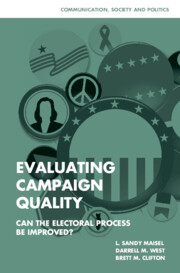1 - Campaign Reformers: Optimists, Skeptics, and Rejectionists
Published online by Cambridge University Press: 03 December 2009
Summary
At a time when much of the world is turning to democracy, it is ironic that many Americans are dissatisfied with the quality of their own political contests. Politicians are accused of adopting uncivil styles of discourse. Consultants are charged with engaging in manipulative and/or deceptive behavior. Observers say candidates avoid detailed substance in their campaign appeals. Voters complain that political campaigns have become overly negative and are not very informative.
Given the dissatisfaction that exists regarding American campaigns, a broad range of academic writers and nongovernmental organizations has pushed for improvements in how races are conducted. Reform groups such as Common Cause, the Alliance for Better Campaigns, the Center for Voting and Democracy, the Institute for Global Ethics, and the Project for Excellence in Journalism have developed ideas for more debates and issue forums, providing training schools for consultants and journalists and strengthening ethical standards that they believe will improve the process. The Pew Charitable Trusts, the Markle Foundation, the Open Society Institute, the Ford Foundation, the Carnegie Corporation of New York, the Smith Richardson Foundation, and others have committed millions of dollars to investigating whether voluntary codes of conduct signed by candidates, self-regulation by consulting trade associations, the development of formal accreditation and certification programs for campaign consultants, and other reforms will strengthen democratic institutions.
- Type
- Chapter
- Information
- Evaluating Campaign QualityCan the Electoral Process be Improved?, pp. 1 - 14Publisher: Cambridge University PressPrint publication year: 2007



